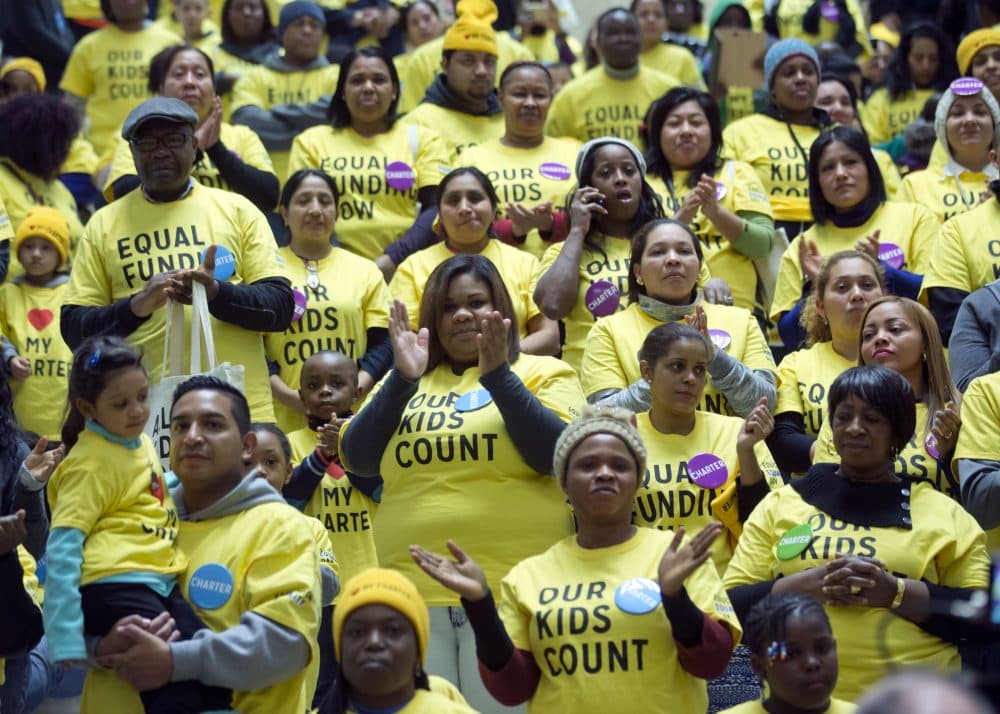Advertisement
As A Pressure Group Folds, Mass. Charter Advocates Survey The Damage

When Families For Excellent Schools brought its charter-school advocacy to Massachusetts, it carried a reputation with it: of a media-savvy, New York-tested organization backed by powerful donors.
Three years later, as the organization — known as FES — plans to close amid scandal, Massachusetts’ ed reform advocates say they’re glad to be rid of it.
"The bipartisan coalition that was strongly in support of charter schools — equally Republican, equally Democrat, equally independent — has been shattered through this campaign and the tactics employed by FES," said Marc Kenen, former executive director of the Massachusetts Charter Public School Association, which filed the 2016 ballot question that would have lifted the state cap on charter schools.
FES became the largest financial backer of that initiative, funneling nearly $20 million into the “Yes on 2” campaign, mostly through its advocacy arm. The group’s name appeared twice at the end of TV ads featuring Gov. Charlie Baker, as he implored suburban voters to vote “Yes,” saying, “If you like your school, Question 2 won’t affect you.” That ad and others liked it blanketed the airwaves in Massachusetts in the run up to the 2016 vote.
But teachers’ unions and politicians like Mayor Marty Walsh argued that premise, pointing to budget shortfalls in traditional public schools that increased charter enrollment could only exacerbate.
In the end, Question 2 was defeated handily at the polls. For its backers, much of the reckoning, and regret, has focused on FES.
The group has also faced trouble of its own making since the vote. Last September, FES agreed with the state's Office of Campaign and Political Finance to settle alleged campaign-finance violations with the largest penalty in that office's history. It agreed to abstain from election-related activity for four years and it published the names of donors who — state officials found — had been inappropriately shielded from public scrutiny. (FES did not admit to any wrongdoing as part of the settlement.)
Then, just last week, FES fired its CEO, Jeremiah Kittredge, citing “inappropriate behavior” and “other factors.” On Monday, FES board chair Bryan Lawrence said FES would close, citing “a series of challenges over the past year.”
FES began as a big presence in New York, smashing lobbying records there and winning over the legislature and Gov. Andrew Cuomo to force New York City to find space for charter schools. They courted celebrities, ran TV ads, and organized rallies outside the New York State Capitol in Albany.
The group came to Massachusetts in 2014. It was an attractive terrain for their work: pitting the nation’s best charter schools against some of its toughest teachers’ unions. Plus, the organization had ties to the Bay State: Kittredge, its whiz-kid CEO, grew up in Cambridge and Lexington. And Jim Peyser, who became the state’s education secretary in 2015, was an FES trustee in 2014.
One longtime advocate who worked on the “Yes on 2” campaign and requested anonymity because he is still involved with the charter school movement, said that when FES joined them, he was partly encouraged. At least, he said, “we’re gonna have a lot of money to put behind our efforts."
But the advocate said that after a couple of months of working with Kittredge, something else became clear: “It wasn’t going to be a partnership. It was going to be a takeover.” He said Kittredge commandeered the campaign and refused the expertise of people on the ground.
“He created a lot of internal tension that, frankly, never healed,” the longtime advocate said.
Kenen said that his organization felt so uncomfortable with FES’ fundraising strategies that they opened another ballot committee in the summer of 2016 “specifically because we did not want to participate in dark money.”
FES and Kittredge did not respond to repeated requests for comment, other than to issue the statements about Kittredge’s firing and the decision to shut down.
Sharhonda Bossier co-founded FES with Kittredge. She helped start its organizing efforts in Massachusetts, but left the organization well before the 2016 vote. She says FES might have become “addicted to winning” with the splashy methods they’d used in New York, and that they’d failed to win over hearts and minds.
“Grassroots organizing work is relational, and it’s slow,” she said. “It’s not as interesting or as fun or as sexy as a big television push.”
Bossier, who now works with a nonprofit designed to promote education leaders of color, also said there was a disconnect between the culture at FES and the parents they purported to represent. Another organizer who worked on the “Yes on 2” campaign — and requested anonymity because she is still involved in education advocacy — cited a “bro culture.”
“It was a disrespect in particular of women, of people of color – anybody who had any kind of experience or expertise,” she said. “We had a lot of people giving us really good advice. It wasn’t taken.”
Her assessment: “What they did was just kinda use parents, people like me, and give the perception that they were giving parents voice.”
For Kenen and others, the task ahead is to rebuild those coalitions they say have been damaged by the campaign.
“We all share some responsibility for what happened during the Question 2 campaign. Absolutely,” Kenen said.
“Politically, we have been weakened,” Kenen concedes. But he remains hopeful about rebuilding. “I don’t see a potential in the very near future of raising the charter school cap. I do see tremendous potential of charter schools to continue having an important role in the development of better educational models that will serve all kids.”

